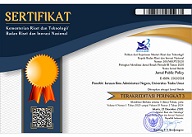EFEK RATCHETING DALAM ANGGARAN BELANJA DAERAH PADA PEMERINTAH KABUPATEN/KOTA DI PROVINSI ACEH
Abstract
Abstract: One pervasive aspect of target setting is the ratcheting effect that happens when targets for the current year are influenced by the difference between last year’s performance and its target. Lee and Plummer (2007) documented ratchet effect in public sector budgeting on performance based budgeting implementation. This study aims to find whether ratchet effecct occur in expenditure budgeting.The population used in this study is 23 local government district/urban in the Aceh Province with the observation period of 5 years (2010-2014). Simple Linear Regresion was used to test the hypotheses. The The result shows that ratchet effect occurs in expenditure budgeting,
Keywords: ratcheting effect, budgeting and expenditure goverment.
Abstrak: Salah satu aspek yang meresap dalam pengaturan target adalah efek ratcheting yang terjadi ketika target untuk tahun berjalan dipengaruhi oleh perbedaan antara kinerja tahun lalu dan targetnya. Lee dan Plummer (2007) mendokumentasikan terjadinya efek ratchet pada penganggaran sektor publik dalam implementasi model penganggaran berbasis kinerja. Penelitian ini dilakukan untuk mengetahui adanya efek ratchet dalam anggaran belanja daerah. Populasi yang digunakan dalam penelitian ini adalah 23 pemerintah kabupaten/kota di Provinsi Aceh. Model regresi lineier sederhana digunakan untuk menguji hipotesis penelitian. Hasil penelitain membuktikan bahwa terjadi efek ratcheting dalam anggaran belanja daerah.
Kata kunci: efek ratcheting, anggaran, dan belanja daerah .
Full Text:
PDFReferences
Abdullah, S. & Abdul H. (2006). Studi atas Belanja Modal pada Anggaran PemerintahDaerah dalam Hubungannya dengan Belanja Pemeliharaan dan Sumber Pendapatan. Jurnal Akuntansi Pemerintah, 2 (2): 17-32
Anessi-Pessina, Eugenio, Mariafrancesca, S., Ileana, S. (2012). Budgeting and Rebudgeting in Local Govermentss-Siamese Twins. Public Adminstration Review 72 (6): 875-884.
Abdullah , S. (2012). Perilaku Oportunistik Legislatif dan Faktor-faktor yang Mempengaruhinya: Bukti Empiris dari Penganggaran Pemerintah Daerah di Indonesia. Disertasi (Tidak Dipublikasikan).Yogyakarta: Universitas Gadjah Mada.
Abdullah, S. & Ramadhan, F. (2014). Faktor-Faktor yang Mempengaruhi Perubahan Alokasi Belanja Dalam Anggaran Daerah. Skripsi Tidak Dipublikasikan, Universitas Syiah Kuala.
Abdullah, S. & Riza Rona. (2015). Pengaruh Sisa Anggaran, Pendapatan Sendiri dan Dana Perimbangan terhadap Belanja Modal: Studi atas Perubahan Anggaran Kabupaten/Kota di Indonesia. Makalah Dipresentasikan pada Konferensi Ilmiah Akuntansi ke-II, IAI Wilayah Jawa Timur, di Universitas Kanjuruhan Malang, 29-30 April 2015.
Abdullah, S. & Afrah, J. (2016), Bukti empiris pengaruh budget ratcheting terhadap hubungan antara pendapatan sendiri dan belanja daerah pada kabupaten/kota di aceh, Modus 28(2), 185-201.
Aranda, C. Arellano, J., Antonio D. (2010). Ratcheting effect and the role of relative target setting. Working Papers, University of Navarra, Spain.
Brownell, Peter and Morris McInnes. (1986). Budgetary Participation, Motivation, and Managerial Performance. The Accounting Review, 61(4): 587-600.
Diehl, Paul F. (1985). Trents In Military Allocations 1816: What Goes Up Does
Not Always Come Down. Armed Force & Society, 12 (1): 134-144.
Fozzard, A. (2001). TheBasic Budgeting Problem Approaches to Resource Allocation in the Public Sector and their Implications for Pro-Poor Budgeting. Working Paper 147.
Forrester, John P., $ Daniel R. Mullin. (1992). Rebudgeting: The Serial Nuture of Municipal Budgetary Processes. Public Administration Review, 52 (2): 467-473.
Hercowitz, Zvi and Michel Strawczynski. (2002). Cyclical Ratcheting in Government Spending: Evidence from the OECD. Working paper. Bank of Israel. December.
Isaksen, Jaya, I Putu Ngurah Panji Kartika & A.A.N.B. Dwirandra. (2014). Pengaruh Pendapatan Asli Daerah pada Belanja Modal dengan Pertumbuhan Ekonomi Sebagai Variabel Pemoderasi. E-Jurnal Akuntansi
Universitas Udayana, 7(1): 79-92.
Jones, L. R. & K. J. Euske. (1991). Strategic Misrepresentation in Budgeting.
Journal of Public Administration Research and Theory, 1(4): 437-460.
Lee, T. M. & Plummer, E. (2007), Budget adjustments in response to spending variances: Evidence of ratcheting of local government expenditures, Journal of Management Accounting Research, 19(1), 137-167.
Larkey, Patrick D. & Richard A. Smith. (1989). Bias in the Formulation of Local Government Budget Problems. Policy Sciences, 22(2): 123-166.
Leone, A. & S. Rock. (2002). Empirical Tests of Budget Ratcheting and Its Effect on Managers’ Discretionary Accrual Choices. Journal of Accounting and Economics, 33: 43-67.
Lim, Dongkuk. (2011). Budget Ratcheting and Agency problem. Dissertation.
The University of Texas at Dallas.
Lee, Caroline. (2013). The Empirical Analysis of Target Ratcheting under Self-Evaluation.
http://papers.ssrn.com/So13/papers.cfm?abstract_id=2359321.
Marlowe, J, (2009), Budget variance, slack resources, and municipal expenditures, SSRN Library.
Republik Indonesia. Peraturan Pemerintah Nomor 105 Tahun 2000 tentang Pengelolaan dan Pertanggungjawaban Keuangan Daerah.
________________. Peraturan Menteri Dalam Negeri Nomor 13 Tahun 2006 tentang Pedoman Pengelolaan Keuangan Daerah.
Susanto, A. A., & Abdul Halim. (2018). Efek Roda Gigi Searah pada Penganggaran Pemerintah Daerah (Studi Empiris pada Pemerintah Provinsi Daerah Istimewa Yogyakarta). Jurnal Akuntansi dan Akuntabilitas Publik, 1. Voorhees.
Smith, Robert W. & Mark Bertozzi. (1998). Principals and agents: An explanatory model for public budgeting. Journal of Public Budgeting, Accounting & Financial Management, 10(3): 325-353.
Weitzman, M. L., (1980). The "Ratchet Principle" and performance incentives, The Bell Journal of Economics, 11(1), 302-308.
DOI: https://doi.org/10.35308/akbis.v0i0.1019
Refbacks
- There are currently no refbacks.





